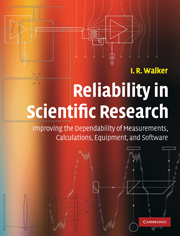 Reliability in Scientific Research
Reliability in Scientific Research Published online by Cambridge University Press: 05 June 2012
Introduction
The ubiquity of computers in just about every aspect of experimental work, from their use in preliminary literature searches, through the collection and analysis of data, to the final publication of results, means that the consequences of their imperfections are unavoidable. Although hardware and software problems are both a possible cause of frustrations, the latter can be particularly insidious, and harder to solve.
The failure of hardware is sometimes heralded by unusual physical phenomena such as excessive vibrations or noises. On the other hand, failures of software take place suddenly and without warning. Also, again unlike the situation with hardware, the concept of safety margins (or “derating”) normally does not exist in software design. The enormous complexity of many types of software when compared with hardware makes the former particularly susceptible to unforeseen failure modes. (For example, operating systems and large applications often contain millions, or even tens of millions, of lines of source code.) These characteristics can all make software failures especially troublesome.
Computers and operating systems
Selection
Compared with many other electronic devices, computers (including their hardware, software, data storage, security and interconnection aspects) are generally very unreliable. Hence, and since they play such an important part in so many facets of research, it pays to use high-quality computer equipment and software.
The quality of computer hardware varies over a wide range – from systems of marginal dependability, to ones that can be counted on to give years of reliable service.
To save this book to your Kindle, first ensure [email protected] is added to your Approved Personal Document E-mail List under your Personal Document Settings on the Manage Your Content and Devices page of your Amazon account. Then enter the ‘name’ part of your Kindle email address below. Find out more about saving to your Kindle.
Note you can select to save to either the @free.kindle.com or @kindle.com variations. ‘@free.kindle.com’ emails are free but can only be saved to your device when it is connected to wi-fi. ‘@kindle.com’ emails can be delivered even when you are not connected to wi-fi, but note that service fees apply.
Find out more about the Kindle Personal Document Service.
To save content items to your account, please confirm that you agree to abide by our usage policies. If this is the first time you use this feature, you will be asked to authorise Cambridge Core to connect with your account. Find out more about saving content to Dropbox.
To save content items to your account, please confirm that you agree to abide by our usage policies. If this is the first time you use this feature, you will be asked to authorise Cambridge Core to connect with your account. Find out more about saving content to Google Drive.